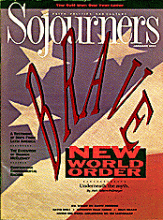He found Jesus in a Georgia jail. His death-row friend, Billy Neal Moore, first opened up the good news of the gospel to him. And from then on, he was known as a peacemaker. He intervened when arguments heated toward violence, and he was the one everybody came to when they needed a calming word. Even the prison staff were grateful to him, because they knew their own lives were a lot safer because of the way Warren McCleskey lived.
"His faith meant everything in life," says Murphy Davis, Georgia director of the Southern Prison Ministry and a member of the Open Door Community in Atlanta, who knew McCleskey for 10 years while he was on death row. "He came out of a life in chaos and ordered everything around his commitment to faith."
That chaos included a mother who sold bootleg corn liquor to help support her seven children, and an abusing stepfather who operated an illegal gambling casino in their home in the "Skid Row" area of Marietta, Georgia. In 1963--a year before Warren graduated from high school--his mother shot his stepfather; the killing was ruled an act of self-defense.
Fifteen years later, on the morning of May 13, 1978, Warren McCleskey, Ben Wright Jr., Bernard Dupree, and David Burney robbed the Dixie Furniture Store in Atlanta. Atlanta police officer Frank Schlatt responded to a silent alarm. Evidence suggests that two bullets from the gun of Ben Wright killed Schlatt.
Read the Full Article

